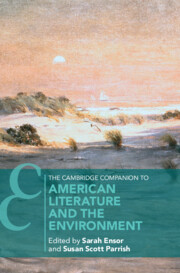Book contents
- The Cambridge Companion to American Literature and the Environment
- The Cambridge Companion to American Literature and the Environment
- Copyright page
- Dedication
- Contents
- Figures
- Contributors
- Acknowledgments
- A Note on the Cover Image
- Introduction
- Part I Environmental Histories
- Chapter 1 Scenes of Human Diminishment in Early American Natural History
- Chapter 2 Slavery and the Anthropocene
- Chapter 3 (In)conceivable Futures: Henry David Thoreau and Reproduction’s Queer Ecology
- Chapter 4 Narrating Animal Extinction from the Pleistocene to the Anthropocene
- Chapter 5 Pastoral Reborn in the Anthropocene: Henry David Thoreau to Kyle Powys Whyte
- Part II Environmental Genres and Media
- Part III Environmental Spaces, Environmental Methods
- Notes
- Index
- Cambridge Companions to …
Chapter 5 - Pastoral Reborn in the Anthropocene: Henry David Thoreau to Kyle Powys Whyte
from Part I - Environmental Histories
Published online by Cambridge University Press: 10 March 2022
- The Cambridge Companion to American Literature and the Environment
- The Cambridge Companion to American Literature and the Environment
- Copyright page
- Dedication
- Contents
- Figures
- Contributors
- Acknowledgments
- A Note on the Cover Image
- Introduction
- Part I Environmental Histories
- Chapter 1 Scenes of Human Diminishment in Early American Natural History
- Chapter 2 Slavery and the Anthropocene
- Chapter 3 (In)conceivable Futures: Henry David Thoreau and Reproduction’s Queer Ecology
- Chapter 4 Narrating Animal Extinction from the Pleistocene to the Anthropocene
- Chapter 5 Pastoral Reborn in the Anthropocene: Henry David Thoreau to Kyle Powys Whyte
- Part II Environmental Genres and Media
- Part III Environmental Spaces, Environmental Methods
- Notes
- Index
- Cambridge Companions to …
Summary
This chapter argues for the rebirth of pastoral in the twenty-first century: as a genre responsive to climate change, mindful of the extinction of many species, and bearing the unique insights of indigenous peoples, with their memory of past catastrophes and their vision for a sustainable future. Woven into this argument are three classic American authors -- Washington Irving, Henry David Thoreau, and Herman Melville – each preoccupied with the subjection of Native peoples, but imagining very different fates for them. In Irving, the ruthless ascendency of colonial settlers makes Native demise a foregone conclusion. Moby-Dick, on the other hand, tells a more conflicting story. In spite of the casual reference to the “extinction” of the Pequots, the persistence of Native characters throughout the novel suggests that they might be here to stay. It is Tashtego’s “red arm and hammer” that we see at the book’s climactic end. Thoreau also equivocates, at one point showing the Abenaki as more firmly ensconced in their habitat than he himself can ever be. In this way, he looks forward to the pastoral affirmation of indigenous survival in the philosophy of Kyle Powys Whyte, and the climate activism of the Standing Rock Sioux tribe.
Keywords
- Type
- Chapter
- Information
- Publisher: Cambridge University PressPrint publication year: 2022



